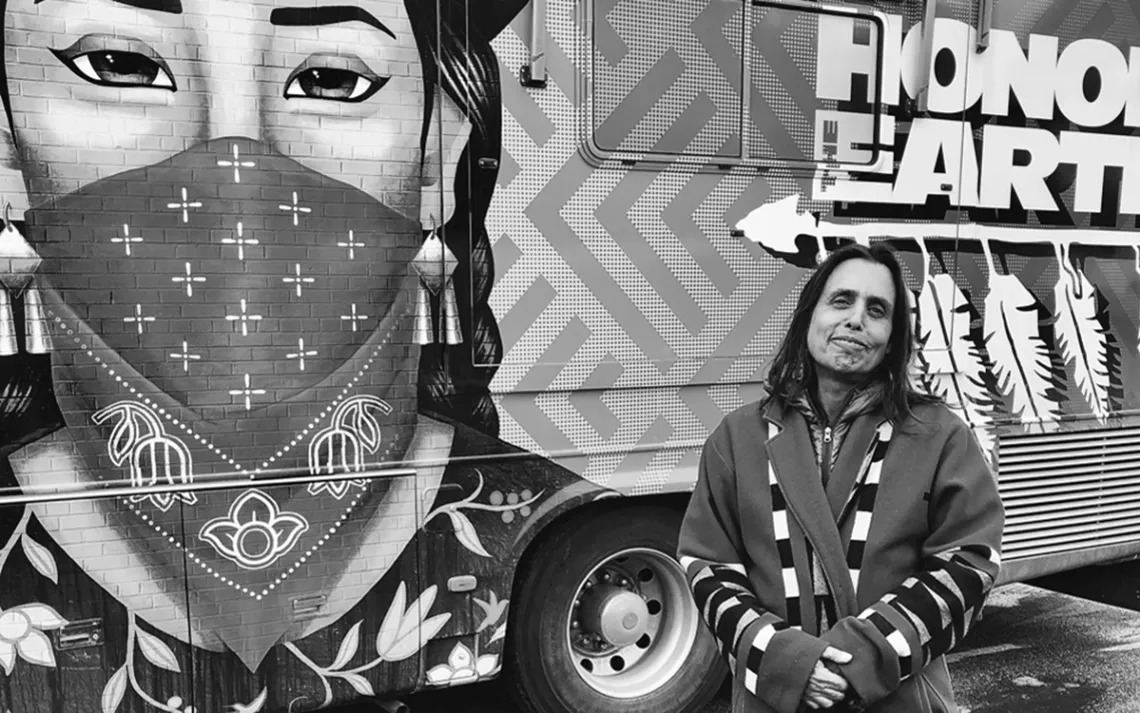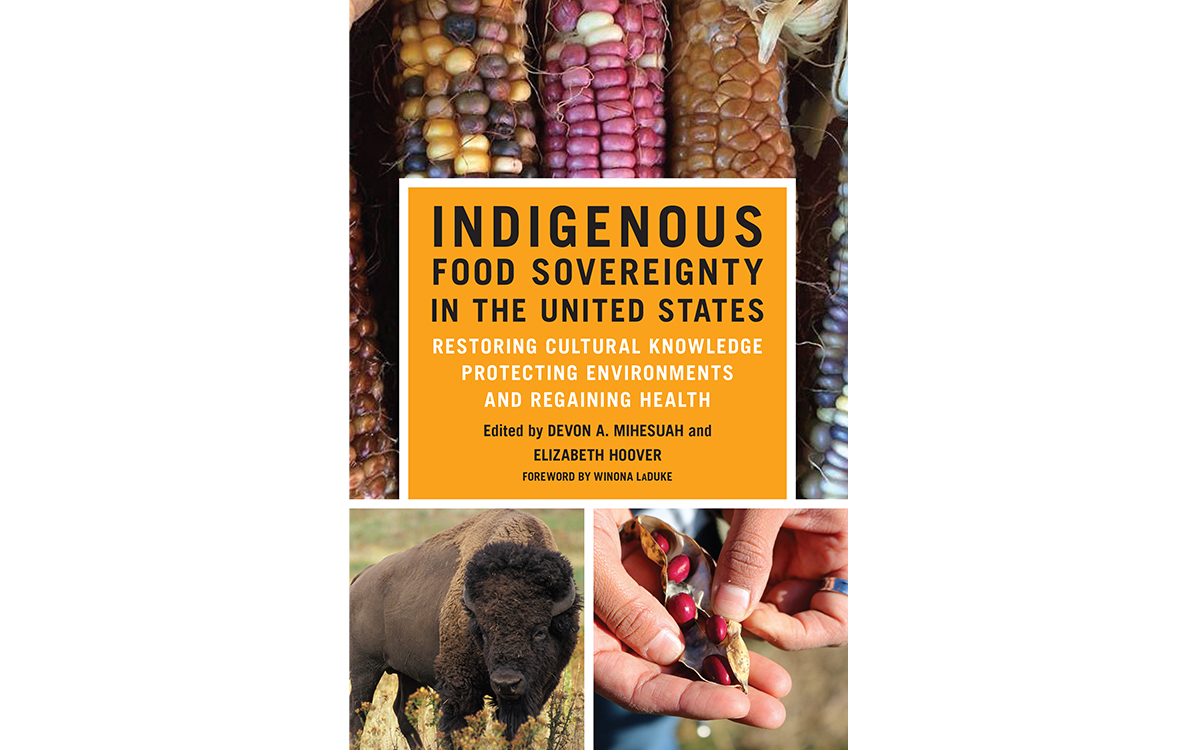In Praise of Seeds and Hope
Excerpted from "Indigenous Food Sovereignty in the United States"

This Indigenous Peoples' Day, we're reading Indigenous Food Sovereignty in the United States: Restoring Cultural Knowledge, Protecting Environments, and Regaining Health (University of Oklahoma Press, August 2019), a collection of 14 essays by Indigenous and environmental activists addressing the social, political, economic, religious, and climate concerns associated with Indigenous food and health. The book was edited by Devon A. Mihesuah, a member of the Choctaw Nation and a professor of international cultural understanding at the University of Kansas; and Elizabeth Hoover, a professor of American studies at Brown University. Its foreword by Winona LaDuke—an Anishinaabe writer and economist from Minnesota's White Earth reservation and the executive director of Honor the Earth—appears below.
At this moment, when food systems are being shaken by drought and industrial poisons and our Indigenous communities suffer the ravages of colonial food, the voices in this book, strong and rooted, come together to tell their stories, tell our stories. For the past 20 years, a renaissance of Indigenous food systems has flourished. This is indeed the time of prophecies. We are told that in this time of the Sixth Fire, we will go and find ourselves, our foods, our songs, and our way. This remembrance of our foods and ourselves will make us stronger. This book records those voices—the voices of remembering, of returning, and of the songs for new seeds. For indeed, seeds are promise.
 When I was a young woman at Harvard University, my father came to me one day and said, “I don’t want to hear your philosophy if you cannot grow corn.” In the simplicity of those words is not only the story of my life but a ground truth. If we are unable to feed ourselves, we will not survive; and if we lose our whole being to our minds, policy work, and scholarly discussions, we will have lost our direction. We need to strike a balance. Think of it this way: our ancestors navigated by stars, lakes, and trees; today, we navigate with a global positioning system. Due to pollution we can no longer even see many of the stars; that is, unless we return to the lands and the fields. Indeed, we must be conscious and work our way back to the soil. The soil and the seeds help us navigate the future. The chapters in this book seek to strike that balance between the documentation of history and the creation of policy versus the on-the-ground work and needs of Indigenous communities.
When I was a young woman at Harvard University, my father came to me one day and said, “I don’t want to hear your philosophy if you cannot grow corn.” In the simplicity of those words is not only the story of my life but a ground truth. If we are unable to feed ourselves, we will not survive; and if we lose our whole being to our minds, policy work, and scholarly discussions, we will have lost our direction. We need to strike a balance. Think of it this way: our ancestors navigated by stars, lakes, and trees; today, we navigate with a global positioning system. Due to pollution we can no longer even see many of the stars; that is, unless we return to the lands and the fields. Indeed, we must be conscious and work our way back to the soil. The soil and the seeds help us navigate the future. The chapters in this book seek to strike that balance between the documentation of history and the creation of policy versus the on-the-ground work and needs of Indigenous communities.
Following the lead of my father, and so many others, I became a corn grower. First Ricardo Salvador gave me Bear Island Flint from the GRIN (Germplasm Resources Information Network) collection. I have seen the return of that variety—our seed from the island in the midst of Leech Lake Reservation—to gardens in our communities. I have seen even more varieties of mandaamin— corn, wondrous seed—return and flourish. Indeed, in a time of climate change, as described by Kyle White in this book, we have found that these seeds are resilient—never a crop failure, despite winds, droughts, and freezes. The corn has taught me hope, commitment, and a return to the craft of cooking—restoring hominy-making knowledge and recipes to our community. As my father surmised, corn teaches all of us.
At the first gatherings of Indigenous food producers at Slow Food International’s Terra Madre event, we came to recognize our place in the international struggle of Indigenous peoples protecting and reclaiming the food the Creator gave us: our foods are who we are. Since then, and through subsequent Indigenous gatherings during which I have met many of the contributors to this book, our movement has grown and flourished as Indigenous food sovereignty takes root in our communities across Turtle Island. Our food and our future are related. And, with the emergence of the Turtle Island Association of Slow Food in 2016, we have taken our place at the international table of a movement for just, clean, and good foods worldwide. “You cannot say you are sovereign if you cannot feed yourself,” Sugar Bear Smith of Oneida once said to me. Clear and affirming. We are the people growing and restoring the sovereign practice of food.
Despite the $13 billion corporate food industry, 70 percent of the world’s food is grown by families, peasants, and Indigenous farmers. We are those people, and today when we return to our farms and our seeds, we take our place in history. In a time when agrobiodiversity has crashed and world food systems are filled with poisons, our seeds remain, and they return. These are our stories: stories of love and stories of hope.
It is said that in the time of the Sixth Fire we will go looking for much of what was stolen or lost, and we will recover those songs, medicine bundles, and seeds. Then we will come into the time of the Seventh Fire. In that time it is said we will make the choice between a scorched path and a path that is green. The essential part of following that green path is how we return to living here on this land. At the center is producing our food again, feeding our people. That is how we reaffirm our covenant and agreement with the Creator. We are becoming the people who no longer import our food from across the country, hemorrhaging our tribal budgets, but instead exercise and affirm the power of our relationship with our food.
To those who have collected these stories, I am grateful. And to those of us who have found our corn, I say find your courage in those seeds that you plant. Because those seeds are about hope, promise, commitment, the future. And in returning to our seeds and fields we are able to fulfill our responsibilities to all of our relatives, whether they have wings, fins, roots, or paws. Food sovereignty is an affirmation of who we are as Indigenous peoples, and a way, one of the most sure-footed ways, to restore our relationship with the world around us. That is the story of this book. These are stories of heroes of the time of the Seventh Fire. I am grateful to be present at this time.
 The Magazine of The Sierra Club
The Magazine of The Sierra Club



